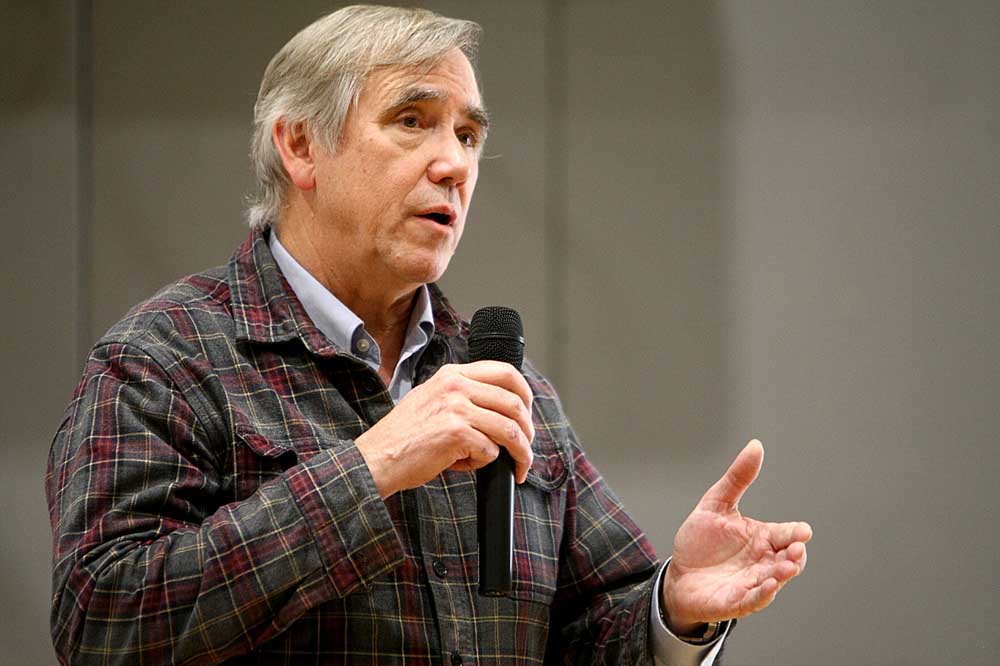Capital Chatter: 30 questions for Knute and Kate
Published 8:00 am Thursday, October 11, 2018

- Capital Chatter: Dangerous times for the Oregon Legislature
Three debates. Questions answered and questions dodged. Nifty campaign rhetoric. Big promises. Heartfelt stories. Repetitious political jabs. No gaffes.
Oregonians now know more about their two leading gubernatorial candidates, Gov. Kate Brown and Rep. Knute Buehler, and a little about Independent Party candidate Patrick Starnes, who was invited only to the first debate.
Trending
That initial debate focused on youth issues, whereas the others were general. I like themed debates, because they yield greater insights into candidates’ ideas and depths of knowledge.
If there were to be a fourth debate between Democrat Brown and Republican Buehler — which there won’t be — I would focus on the governor’s role as CEO of Oregon, add a few still-getting-to-know-you questions, reiterate questions that remain unanswered and, to spice it up, end with a lightning round of yes-or-no questions.
This is a job interview, after all, for the highest job in the state. The debate would be scored. Each candidate would lose points for 1) failing to give a direct answer; 2) complaining about or criticizing the opponent, which is highly inappropriate in a job interview; 3) exceeding time limits; and 4) general surliness.
The questions:
• One of you will be CEO of Oregon. What would your management approach be?
• Gov. Brown, there has been significant turnover in your office staff and office leadership during your tenure as governor and previously as secretary of state. Why?
Trending
• Rep. Buehler, why should voters believe you have the expertise to effectively lead and manage a sprawling state government composed of dozens of agencies?
• What was one of the worst managerial mistakes you made, and what did you learn from it?
• Give an example of a current state agency that you believe operates well and one you think needs an overhaul – and why.
• History shows there’s a good chance that whoever is elected will face an unexpected crisis in the state. Since no one knows what that crisis will be, why should Oregonians choose you as the best person to handle any crisis?
• The Oregon Department of Revenue has a reputation for aggressively auditing individual taxpayers and small businesses for relatively small amounts of money — amounts where the department is likely to collect because it’s not cost-effective for the taxpayer to hire a lawyer. What do you think of Rep. Greg Smith‘s idea that if a small business fully passes an audit in a tax area, it would a several-year exemption from future audits in that same area?
• Businesses want certainty, yet the Legislature — and sometimes the governor — keep adding regulations and rarely take any away. Often these rules differ from the related federal rules. That divergence drives up costs for businesses by forcing them to spend time checking two sets of complicated rules. Will you develop ways for easing that burden by better coordinating state and federal rules without undercutting the intent of Oregon regulations?
• On a related note, the state has thousands of administrative rules that implement laws. Too often those rules are vexing to the legislators who wrote the underlying legislation and to the people governed by those rules. Will you work with the Legislature to create an ongoing process for reviewing and clarifying administrative rules that remain necessary and eliminating ones that are obsolete?
• Do you expect your appointees to state boards and commissions to be politically independent of you in their actions or, as sometimes has occurred, will you sometimes insist they vote a certain way?
• If you were to offer your opponent a job in your administration, what position would it be and why?
• Gov. Brown, after the 2017 Legislature concluded, you said that you and legislative leaders would work on a revenue package for the 2019 Legislature. So far, you have revealed no such proposals. If you are re-elected, your 2019-2021 budget will be due less than a month after the election. What specific revenue increases will you propose? If you are unwilling to say at this time, why should voters believe you’ll follow through.
• Rep. Buehler, what specific tax increases or new tax and fees would you support and under what circumstances?
• Agencies propose roll-forward budgets, instead of starting with zero-based budgeting that first assesses whether existing programs are needed and are working. How would you encourage and reward agencies for taking a zero-based budgeting approach?
• Gov. Brown, your blue-ribbon PERS task force discovered the state lacked an overall inventory of the land and buildings it owns. A year has passed. Has that inventory been completed; if not, why?
• Gov. Brown, the Oregon Supreme Court has thrown out many PERS reforms as illegal. That leaves people arguing whether other potential reforms would be OK. Why not ask the Legislature to approve the main remaining reform ideas, such as ending all pension “spiking,” so the court would decide their legality once and for all? Even if the projected savings were minimal, those questions would be resolved for the public, politicians and public-employee unions. To avoid budget problems, the money “saved” should be put in an escrow account until the courts ruled, instead of being spent.
• Rep. Buehler, you propose a 15 percent increase in state education spending, paid for in part by reducing the costs of state employee pensions and health care. You believe those cost reductions can be achieved; but if they are not, how would you pay for the education increase?
• Rep. Buehler, you’re a well-to-do surgeon. Your house on the Deschutes River in Bend reportedly is worth around $1 million. How can everyday Oregonians believe you’ll be in touch with their concerns?
• Gov. Brown, you’re from Portland. Geographically, urban Oregon is a small part of Oregon. As was recounted in the inaugural issue of The Other Oregon magazine, rural Oregonians believe they are not understood by urban dwellers — politically, socially and culturally. How can Oregonians throughout the state trust that you will understand and follow through on their concerns?
• Rep. Buehler, you were largely out of sight during the Republican primary season, apparently to avoid alienating the conservative Republican base. In the general election, you’re running as a pro-choice, moderate Republican. You reject political labels and say you’re post-partisanship, but people wonder whether you shift positions to fit the election. Even though you dislike the political spectrum, where are you on that spectrum? How can Oregonians trust you’ll be consistent?
• Give an example of how you changed your mind on a political or social issue and why.
• What are the top four things you hope to achieve during the 2019 Legislature? Only four, please, and be specific.
Lightning round: Answer yes or no – only.
• Are you a good manager?
• Do you support the Jordan Cove LNG project?
• Do you support tolling in metro Portland and/or on Columbia River bridges as a means to change people’s behavior, such as to increase use of mass transit?
• As governor, your office is in the Oregon State Capitol. Because parts of the Capitol are likely to collapse during The Big One, Senate President Peter Courtney has said it’s irresponsible for the state to let schoolchildren and others visit the Capitol. Do you agree?
• Oregon is behind California and Washington in rolling out the collaborative ShakeAlert system, which could provide micro-seconds to minutes of warning about a quake. Will you push for substantially increased state funding and faster development of the ShakeAlert system?
• Do you commit to having a public town hall meeting in every county every year?
• Do you commit to having press conferences — open to print, broadcast and online media — at least monthly?
• In Oregon’s formative years, people could walk in off the street and talk with the governor. Would you restart that tradition, setting a specific time each month to meet individually with common folk – not lobbyists, campaign donors, agency heads or politicians?
If, by chance, either Brown’s or Buehler’s campaign responds to these 30 questions, I’ll let you know. County elections offices will begin mailing ballots to voters on Oct. 17.
Big change in legislative staff: After more than 22 years as the Legislature’s human resources director, Lore Christopher is retiring. In her announcement Friday, she wrote: “I have committed to be here, on board, to manage a successful transition and to help guide the Employee Services team through August of 2019 to complete the pay equity implementation, reconsideration process and other ongoing critical projects during the on-boarding of the next human resources director.”
Christopher, whose first name is pronounced “Laurie,” also was the longtime, well-regarded mayor of Keizer.
Being human resources director in a political environment can’t be easy. It is ironic that the Legislature, which passed the pay equity legislation, now confronts the difficulty of implementing it. Businesses are struggling as well. Christopher and Legislative Counsel Dexter Johnson also have been dealing with allegations of sexual harassment involving legislators and staff.
As part of the job posting for a new HR director, the six-page position description includes this statement about decision-making: “Erroneous decisions could adversely impact employees and/or the legislative agencies with consequences ranging from poor morale and disgruntled employees to expensive litigation and/or settlements.”
Yep.
The job announcement lists a salary of $89,508 to $138,468 annually. That’s up to five times more than legislators get. Legislators, who are considered part-time, receive $24,216 a year, plus per diem.
Ads everywhere: I was listening to the Folk Rock station on Pandora while writing this column. On came a re-election ad for Rep. Paul Evans, D-Monmouth, who faces a tough challenge from Selma Pierce, a Salem Republican.
I live in the district and our home has received numerous mailings, as well as several visits by campaign volunteers for each candidate, the most recent being members of the Service Employees International Union supporting Evans.
Finally, a forest chief: Washington native Vicki Christiansen this week became the 19th chief of the U.S. Forest Service. She had been the interim chief since Tony Tooke resigned in May — less than a year into the job — amid reports of sexual misconduct in the agency, including allegations against him.
“Her permanent appointment as chief is good news for Oregon because our state knows her as a proven ally in the work to bring balance and common sense to federal wildfire policy and forest management,” Oregon Sen. Ron Wyden said.
I think that means Ducks can forgive Christiansen for being a Husky. She earned her bachelor’s degree from the University of Washington in 1983, while serving as a wildland firefighter. She worked for the Washington Department of Natural Resources for 26 years, including serving as state forester.
Dick Hughes, who writes the weekly Capital Chatter column, has been covering the Oregon political scene since 1976. Contact him at TheHughesisms@Gmail.com, Facebook.com/Hughesisms, YouTube.com/DickHughes or Twitter.com/DickHughes.





